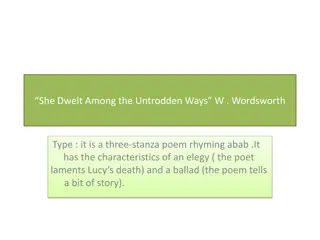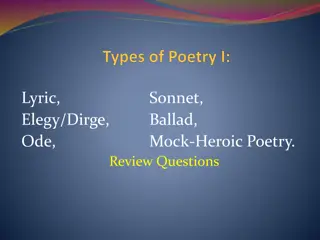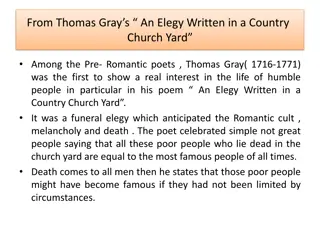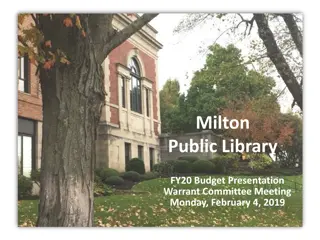Overview of John Milton's Elegy "Lycidas
John Milton's elegy "Lycidas" was written in 1637 to mourn the accidental death of his friend Edward King. The poem reflects on themes of loss, friendship, and poetic expression. It is considered a significant work in English literature and showcases Milton's prowess as a poet during a time of political and religious turmoil.
Download Presentation

Please find below an Image/Link to download the presentation.
The content on the website is provided AS IS for your information and personal use only. It may not be sold, licensed, or shared on other websites without obtaining consent from the author.If you encounter any issues during the download, it is possible that the publisher has removed the file from their server.
You are allowed to download the files provided on this website for personal or commercial use, subject to the condition that they are used lawfully. All files are the property of their respective owners.
The content on the website is provided AS IS for your information and personal use only. It may not be sold, licensed, or shared on other websites without obtaining consent from the author.
E N D
Presentation Transcript
*Lycidas -John milton
John Milton (9 December 1608 8 November 1674) was an English poet and intellectual who served as a civil servant for the Commonwealth of England under its Council of State and later under Oliver Cromwell. He wrote at a time of religious flux and political upheaval, and is best known for his epic poem Paradise Lost (1667), written in blank verse, and widely considered to be one of the greatest works of literature ever written.
Lycidas is an elegy that Milton created in 1637 to lament the death of his friend Edward King. King had been Milton s friend at Cambridge and got drowned due to sinking of his ship. The poem has been created in a reflective mood.
Milton's elegy 'Lycidas' is also known as monody which is in the form of a pastoral elegy written in 1637 to lament the accidental death, by drowning of Milton s friend Edward King who was a promising young man of great intelligence.
Yet once more, O ye laurels, and once more Ye myrtles brown, with ivy never sere, I come to pluck your berries harsh and crude, And with forc'd fingers rude Shatter your leaves before the mellowing year.
The first few lines of this approximately 200-line poem explain the circumstances of King s death in a shipwreck aboard the Chester in the year 1636. The speaker explains that he is picking ubripe berries on occasion of Lycidas s death. Lycidas himself was a poet, and the narrator describes himself and his late friend as shepherds tending a flock. Lycidas sdeath, according to the poet s metaphor, is like a parasite infecting cattle or a rose.
Bitter constraint and sad occasion dear Compels me to disturb your season due; For Lycidas is dead, dead ere his prime, Young Lycidas, and hath not left his peer. Who would not sing for Lycidas? he knew Himself to sing, and build the lofty rhyme. He must not float upon his wat'ry bier Unwept, and welter to the parching wind, Without the meed of some melodious tear.
The poem 'Lycidas' can be conveniently divided into six sections (1) a prologue, four main parts, and an epilogue. In the prologue (lines 1-24) Milton invokes the Muse and explains the reasons for writing the poem. Although Milton had decided not to write poetry till his powers matured, bitter constraint and sad occasion compels the poet to attempt an elegy.
Begin then, Sisters of the sacred well That from beneath the seat of Jove doth spring; Begin, and somewhat loudly sweep the string. Hence with denial vain and coy excuse! So may some gentle muse With lucky words favour my destin'd urn, And as he passes turn And bid fair peace be to my sable shroud!
In the middle of the poem, the poet turns to ask the nymphs why they did not protect Lycidas. He then moves into a contemplation of the point of fame, which many poets seek in order that they live past their mortal life. Apollo (god of music and poetry) answers that fame is not necessarily within a mortal s power to control. Next, Lycidas explains that the ship sank despite fair weather and so may have been cursed.
But O the heavy change now thou art gone, Now thou art gone, and never must return! Thee, Shepherd, thee the woods and desert caves, With wild thyme and the gadding vine o'ergrown, And all their echoes mourn.
That occasion is the untimely death of Lycidas. In the Second Section (lines, 25-84) he describes the type of life Lycidas and the poet had at Cambridge. The descriptions are in pastoral imagery. They together- Lycidas and Milton - began their study early in the morning, continued throughout the day late into the night. Besides, there were innocent recreations. But now that Lycidas was dead; a great change, heavy change had taken place
Last came, and last did go, The Pilot of the Galilean lake; Two massy keys he bore of metals twain (The golden opes, the iron shuts amain). He shook his mitred locks, and stern bespake:
At the beginning of the third section (which contains lines 85-131) Milton returns to the pastoral style, and describes a procession of mourners lamenting Lycidas s death. The procession is led by Triton, the herald of the Sea, and the last to come is St. Peter The Pilot of the Galilean lake. Through the mouth of St. Peter, Milton gives us a burning denunciation of contemporary clergy,
Thus sang the uncouth swain to th'oaks and rills, While the still morn went out with sandals gray; He touch'd the tender stops of various quills, With eager thought warbling his Doric lay;
And now the sun had stretch'd out all the hills, And now was dropp'd into the western bay; At last he rose, and twitch'd his mantle blue: To-morrow to fresh woods, and pastures new.
In the fifth section (lines 164-184) Milton expresses his belief in immortality. Grief and sorrow are temporary. And though Lycidas is apparently dead, he has arisen from the dead: Through the dear might of Him that walked the waves. Lycidas is in heaven, and therefore Weep ye no more. The saints there to entertain him in sweet societies / That sing, and singing in their glory move. The epilogue (lines 185-193) brings us back to the portal images again, and refers indirectly to the Greek Pastoral poets. The conclusion points to a new determination both to face life hopefully, and to rise up to greater poetic achievements.
Thus though 'Lycidas' is a conventional pastoral elegy, which has its origin in the loss of a friend, the poem becomes impersonal and timeless. The elegiac mourning is twice interrupted to invest the personal sorrow with universal significance. This is achieved by making the tragic death of Lycidas as one example of the precariousness of existence, and the tragic irony of fate which renders all human effort futile. A second theme of equally great concern is the degeneration of the Church, and the contemporary neglect of the things of the spirit. 'Lycidas' is undoubtedly one of the greatest short poems in English language.























